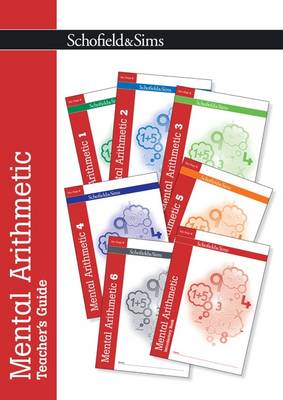Mental Arithmetic
1 total work
Mental Arithmetic provides graded questions that develop children's essential maths skills. Written primarily for Key Stage 2, this seven-book series includes an Introductory Book that may also be suitable for Key Stage 1; Books 5 and 6 provide a bridge to Key Stage 3. A further series, Essential Mental Arithmetic, provides exactly the same material, but with covers designed for more mature users. All the books may be used flexibly for individual,paired, group or whole-class maths practice, or for maths recovery of homework. Separate books of answers are available and a table enabling you to obtain an indication of a pupil's National Curriculum level, using his or her average score test, may be downloaded from this website. With maths glossaries to consolidate understanding, Mental Arithmetic and Essential Mental Arithmetic encourage a disciplined approach to maths. Most of the books include Progress Tests and Results Charts, and Check-up Tests enable you, the teacher, to ensure that the core concepts are mastered. Mental Arithmetic Teacher's Guide provides a full introduction to Mental Arithmetic, suggesting how it may be best used.
This guide is also fully compatible with Essential Mental Arithmetic. If some users are working above or below age-related expectations, you can provide them with Mental Arithmetic or Essential Mental Arithmetic books at an appropriate level, supporting differentiation. This guide includes Assessment resources that will help you to choose the bext book for each individual, including a photocopiable Entry test. In addition, seven Diagnostic checks help you to pinpoint specific areas of difficulty and give you 'Activity prompts' that will help users overcome them. Full marking keys are provided. The General resources section contains further photocopiable resources that you can use to support learning, including fractions charts, examples of 2-D and 3-D shapes, and counting and multiplication squares. The Teacher's Guide helps you to: Assess new pupils Provide regular maths practice Develop pupils' understanding of maths Personalise their learning experience Diagnose problem areas Devise intervention activities Organise group marking sessions Plan individual, paired and group work Set homework Monitor progress Reward achievement
This guide is also fully compatible with Essential Mental Arithmetic. If some users are working above or below age-related expectations, you can provide them with Mental Arithmetic or Essential Mental Arithmetic books at an appropriate level, supporting differentiation. This guide includes Assessment resources that will help you to choose the bext book for each individual, including a photocopiable Entry test. In addition, seven Diagnostic checks help you to pinpoint specific areas of difficulty and give you 'Activity prompts' that will help users overcome them. Full marking keys are provided. The General resources section contains further photocopiable resources that you can use to support learning, including fractions charts, examples of 2-D and 3-D shapes, and counting and multiplication squares. The Teacher's Guide helps you to: Assess new pupils Provide regular maths practice Develop pupils' understanding of maths Personalise their learning experience Diagnose problem areas Devise intervention activities Organise group marking sessions Plan individual, paired and group work Set homework Monitor progress Reward achievement
